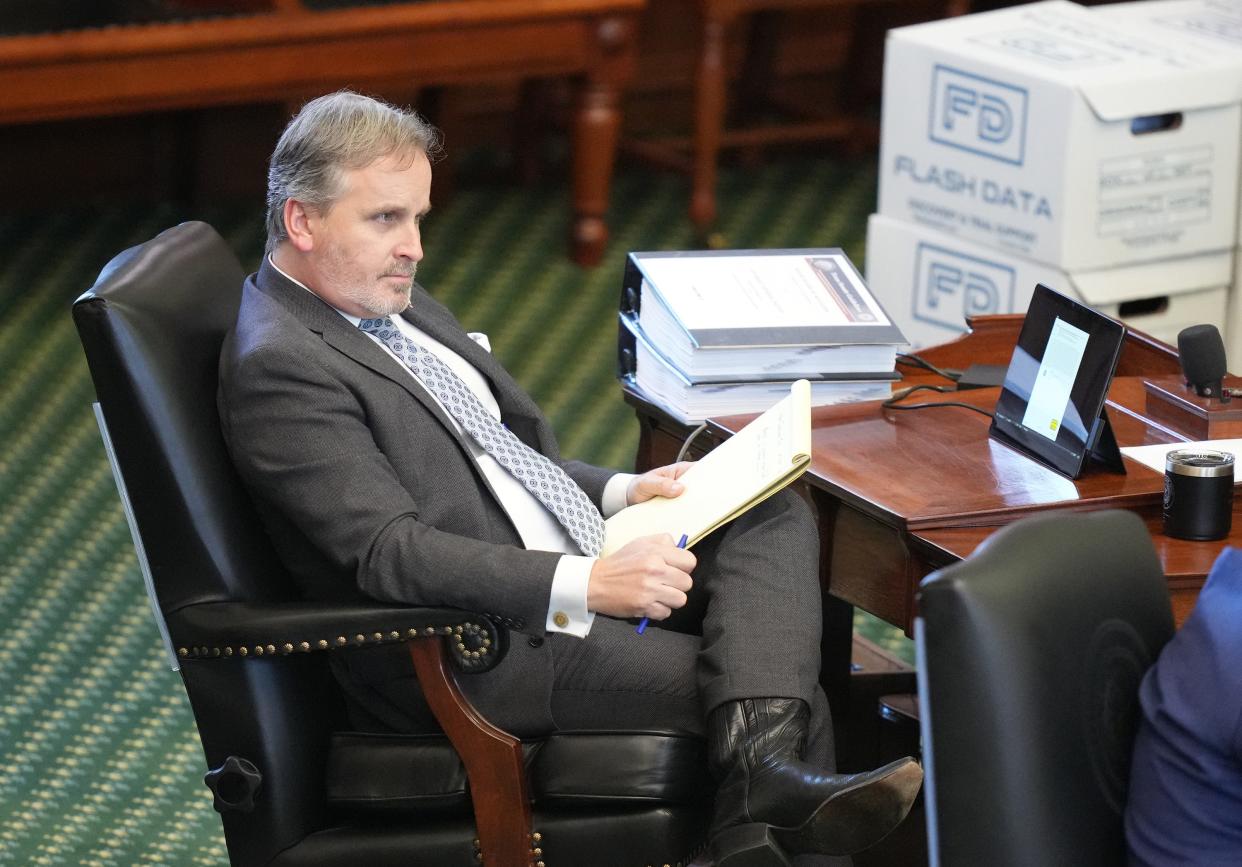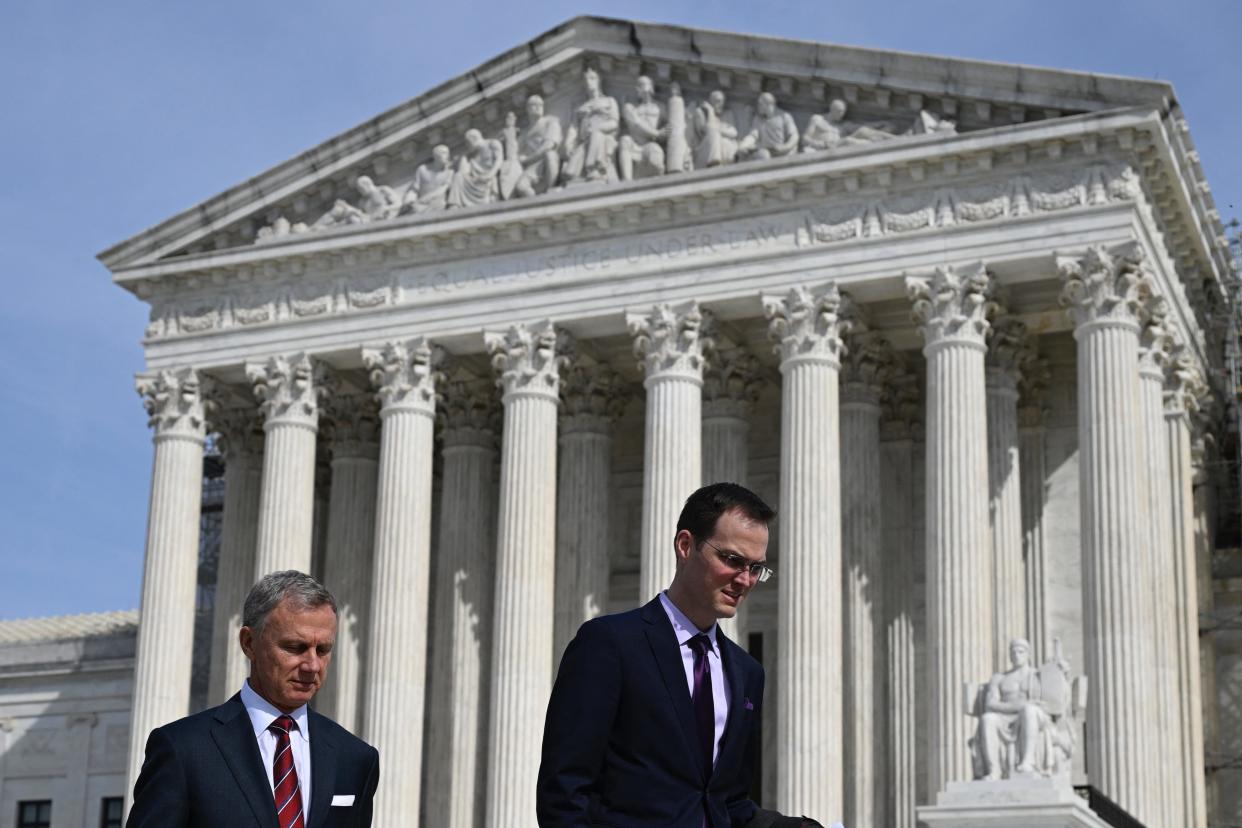US Supreme Court weighing Texas social media law's constitutionality. Here's what we know.
The U.S. Supreme Court is considering what to do about Texas and Florida laws to regulate social media companies' authority over content moderation. On Monday, the high court heard from the states' attorneys who argued the 2021 laws are justified as social media companies, such as Facebook, YouTube, X and Instagram, have been too quick to suppress conservative viewpoints.
While trade groups representing the nation's social media companies, along with the U.S. Justice Department, say the Supreme Court should strike down the state laws because they infringe on the companies' First Amendment right to free speech, others argue the platforms should not be able to restrict users for expressing views on their sites.
As the Supreme Court mulls its next move after Monday's oral arguments, the court is tasked with answering constitutionality questions on both laws, which previous appeals courts have disagreed on.
A three-judge panel for the 11th Circuit Court of Appeals blocked enforcement of most of Florida's law in 2022. But the New Orleans-based 5th U.S. Circuit Court of Appeals upheld the similar Texas law, creating a split in constitutional interpretations.
More: Supreme Court readies for major social media free speech battle: Here are the stakes
At the heart of the matter, the justices must answer the central question of whether the social media platforms are public conduits for information, like a telephone line or the mail, or are private actors entitled to complete First Amendment protections, said Philip Hamburger, a Columbia University School of Law professor.
"So this is why it matters to the justices, does it fall in the category of conduits or in the category of speakers?" Hamburger said during a news conference after Monday's hearing.
What is Texas House Bill 20?
Passed by the Republican-dominated Texas Legislature in 2021, House Bill 20 requires social media companies to publicly detail their content moderation processes and give Texans a recourse if their posts or accounts are removed or suspended.
Specifically, the law states that platforms "may not censor a user, a user's expression, or a user's ability to receive the expression of another person" based on viewpoint or geographical location.

During a news conference after Monday's hearing, state Sen. Bryan Hughes, R-Mineola, who carried HB 20 in the Senate, said; "They control the new town square. Everybody understands that that's where people go to hash it out, to exercise their First Amendment rights, to have a discussion."
Because of the town square argument, Hughes, as well as attorneys and advocates in support of limiting online platforms' ability to regulate speech, say that social media sites are not simply private companies, but public carriers of protected speech, which should be regulated with minimal content restraints.
If the high court upholds Texas' law, the social media giants would be required to inform users about their content use policies; provide biannual reports detailing their instances of removed posts and blocked users; and require companies to notify a blocked user with the reason for their removal, allowing for an opportunity to appeal the decision and possibly involve the attorney general to recover legal fees.
Texas made an outstanding case today in front of SCOTUS. We defended HB 20, our law protecting Texans from online viewpoint discrimination and censorship. Our team did a fantastic job. I’m honored by the opportunity to stand up for our citizens’ essential right to communicate… pic.twitter.com/6pA52sxQ0o
— Attorney General Ken Paxton (@KenPaxtonTX) February 26, 2024
"We defended HB 20, our law protecting Texans from online viewpoint discrimination and censorship," Attorney General Ken Paxton said in post on X from the steps of the Supreme Court on Monday. "Our team did a fantastic job."
Chris Marchese, director of the litigation center for NetChoice, one of two tech trade organizations involved in the dispute, said constitutional provisions to prevent government regulation of speech are still applicable to 21st century mediums.
"Just as the government couldn’t force Benjamin Franklin to publish its preferred messages in his newspapers, Florida and Texas can’t force websites to curate, display, and spread their preferred content," Marchese said in a statement. "The First Amendment protects us and our speech from government encroachment — not the other way around."
More: Texas Supreme Court justice seeking reelection under fire for absenteeism, ethics concerns
Both the Texas and Florida laws, each passed in 2021, have not gone into effect as they've been mired in legal challenges.
What did the Supreme Court say?
The justices were inquisitive of both the Texas and Florida laws Monday, expressing concern over what constitutes social media censorship, what online features should be considered for First Amendment protections and how a future ruling could affect the social media marketplace.
"I thought the argument was fascinating because it really did not break on ideological line," said Adam Candeub, a law professor and director of the Intellectual Property, Information & Communications Law Program at Michigan State University.

With conservative and progressive justices asking numerous questions of both sides throughout each hearing, Candeub said the court is facing a difficult question in whether to limit, and if so by how much, online platforms' editorial discretion.
"The platforms are saying the First Amendment means that even though they are carrying other people's speech, they have a right to kick off anyone they want," Candeub said. "And I think that for most of the justices, that was a very, very bitter pill to swallow."
Outside of the arguments being laid out in the lawsuits brought against Texas and Florida by two tech industry groups — NetChoice and the Computer & Communications Industry Association — the justices wanted to know how a ruling to limit content controls could affect things like direct messaging and other online services that aren't considered to be content-sharing platforms, such as Uber and Amazon.
More: Biden to visit Texas-Mexico border Thursday. Will he change the vexing issue's narrative?
"Does Gmail have the First Amendment right to delete, let's say, Tucker Carlson's or Rachel Maddow's Gmail accounts if they don't agree with his or her viewpoints?" asked Justice Samuel Alito, who was appointed by former President George W. Bush.
Though they took no action Monday, the justices mentioned sending the case back to a lower court for further consideration as an option moving forward. A decision from the court is expected by the end of June.
How are the Florida and Texas content moderation laws different?
While Texas' social media law is focused on limiting the companies' removal of posts and accounts based on a user's viewpoint, the Florida law has broader prohibitive provisions.
After the Jan. 6, 2021, riot at the U.S. Capitol, which resulted in former President Donald Trump being barred from the social media site formerly known as Twitter, Florida lawmakers that year passed a law prohibiting social media companies from banning the accounts of politicians and political candidates.
Under Florida's law, the online platforms could be hit with fines for noncompliance and possibly be subject to legal action by Floridians who feel they were unjustly banned.
In a video posted to X before Monday's hearing, Republican Florida Gov. Ron DeSantis said that normally private companies are not subject to speech regulations, but on account of the editorial discretion social media companies hold over other peoples' views, the court needs to consider limiting their content moderation authority.
More: Florida makes argument in pivotal Supreme Court case, could forever change social media
"We knew this was going to end up before the Supreme Court, this a really important issue," DeSantis said.
Provisions of the Texas law are less connected to First Amendment concerns — such as requirements to disclose content moderation processes and provide biannual reports on removed users and posts — and are not being contested alongside its broader provisions meant to limit the companies' overall ability to monitor and edit users and posts based on viewpoint.
Those differences are part of the reason the separate appeals courts issued diverging opinions on the two laws, upholding HB 20 in Texas and striking down Florida's law.
USA Today reporter Maureen Groppe and Tallahassee Democrat reporter Douglas Soule contributed to this report.
This article originally appeared on Austin American-Statesman: Supreme Court weighs Texas social media law on First Amendment rights
